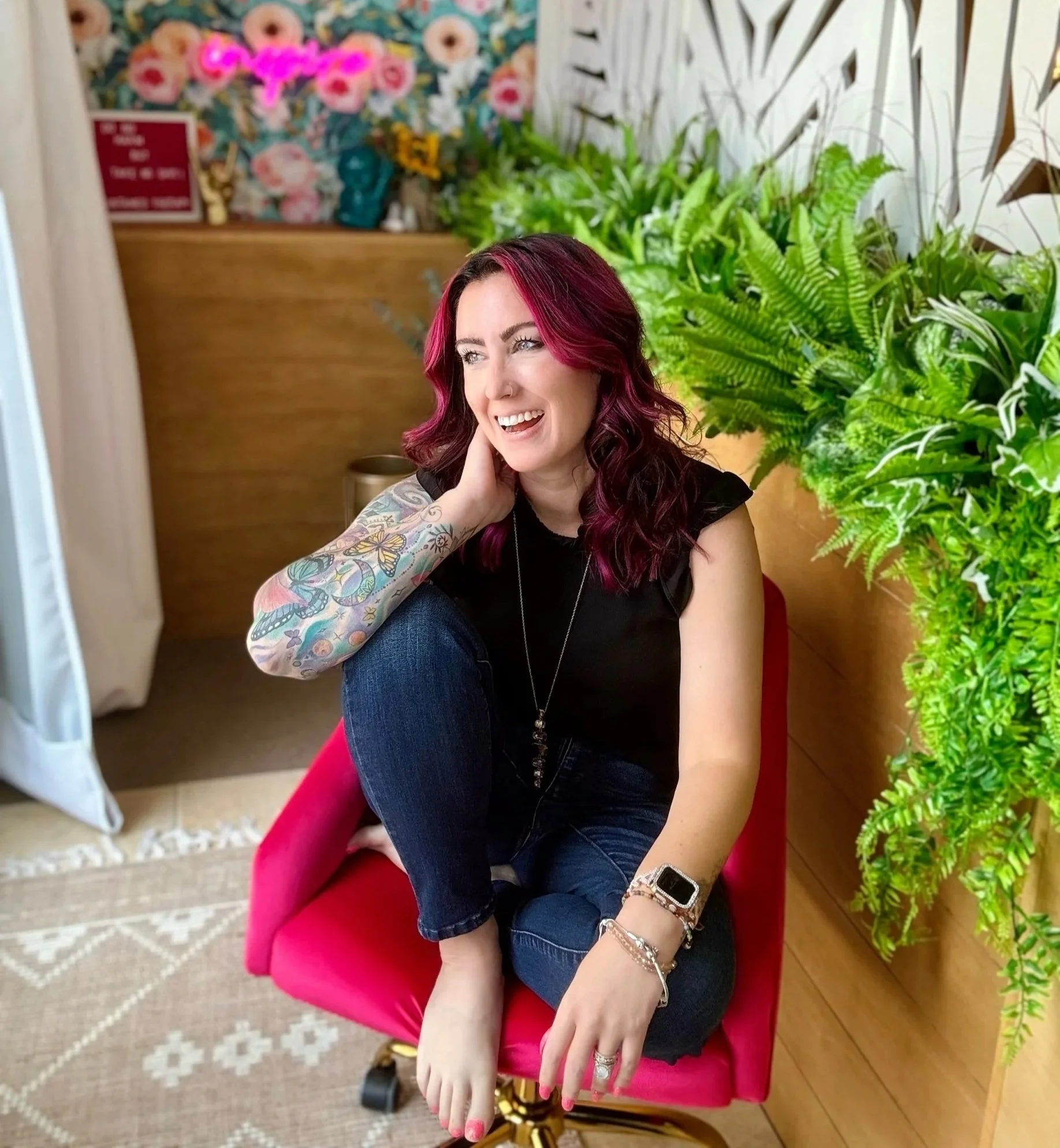Healthy Boundaries: The Antidote to Hyper-Independence Burnout
TL;DR: Setting boundaries feels like trying to walk barefoot across a minefield while everyone around you is clapping for how much shit you can carry. Society worships overcommitment and overachieving. Be the “yes girl,” the ride-or-die, the dependable one who never says no. And if you dare to start flipping the script and say no?! Cue the side-eye, guilt trips, or people acting like you’ve just burned their fucking house down.
If you’re a hyper-independent woman, boundaries can feel like trying to speak a foreign language you were never taught. You’ve been the strong one, the go-to problem solver, the emotional pack mule carrying everyone’s sh*t for so long, you don’t even question it anymore; it’s just how you’ve survived. So when I say "healthy boundaries are self-care," I’m not talking about spa days, essential oils, or slapping a face mask on your burnout. I’m talking about the kind of self-care that rewires your nervous system, protects your peace, and keeps you from burning your entire life down just to make sure everyone else is fucking comfortable by the fire.
Why Boundaries Are So Damn Hard to Set
Here’s the raw truth: most of us weren’t taught boundaries. We were taught to be compliant AF.
Society: “They” have been spoon-feeding us bullshit in glittery packaging since birth. We were handed the “good girl” script before we could even spell boundaries. Be agreeable. Be easygoing. Smile more. Don’t rock the damn boat. And god forbid you say no, suddenly you’re labeled difficult, dramatic, or selfish. So you learn to swallow your needs, overextend yourself, people-please your way through discomfort to keep the peace for everyone else, while quietly throwing yourself under the damn bus.
Relationships: Maybe you grew up parentified; being the emotional support human, crisis manager, and unpaid therapist for the adults around you who couldn’t get their shit together. Or maybe you kept ending up in relationships where having needs got you punished, guilt-tripped, or ghosted.
That kind of trauma doesn’t just disappear; it rewires your brain. It teaches you that boundaries equal abandonment, and asking for what you need is too risky. So you stop asking. You over-function, over-give, overthink and call it love.
Personal Conditioning: Hyper-independence turns boundaries into a mindfuck. You’re already juggling everyone’s chaos like it’s your full-time job, so the idea of saying “I can’t” hits like failure, not self-respect. You’ve been wired to push through, suck it up, and handle it alone, even when you're drowning without a life jacket.
So yeah, no wonder boundary setting feels like choking on glass. It’s not a weakness. It’s unlearning a lifetime of fucked up conditioning.
What Healthy Boundaries Look Like
Boundaries aren’t about being cold, controlling, or being a bitch, they’re about being clear. Healthy boundaries are respectful, non-negotiable guidelines that define how you allow others to treat you and how you commit to treating yourself. They’re not about punishment or shutting people out, they’re about protecting your peace, your energy, and your damn sanity. Boundaries are how you stop abandoning yourself just to keep the boat from rocking. And how you show up for you, with clarity, compassion, and zero apology.
Examples:
Telling a friend, “I’m tapped out tonight and need some quiet. Let’s catch up tomorrow when I can actually be present.”
At work: “I don’t check my emails after 6 p.m. I’ll get back to you during business hours.”
In dating: “I’m looking for clarity and consistency, not mixed signals and mind games. If you’re not looking for the same thing, this won’t work for me.
With family: “If the conversation turns into judgment or drama, I’m stepping away. I’m here for green bean casserole, not chaos.”
Boundaries are not walls. They are doors with locks. You get to choose who comes in, how far they’re allowed to go, and when it’s time to close the damn door and reclaim your space.
How Boundaries Improve Mental Health
Boundaries are straight-up mental health gold. When you actually start setting them, not just thinking about it in the shower, you stop hemorrhaging energy on people, situations, and expectations that leave you feeling like a deflated air mattress at a sleepover.
You feel less resentment and more respect, because you're no longer saying yes when you mean hell no.
Your stress and anxiety drop, because you’re not sprinting to keep up with everyone else’s timeline like it’s a damn emergency.
Your relationships get better because people finally know how to support you without you silently drowning behind a people-pleasing smile.
And maybe most importantly, your nervous system gets to chill the fuck out, no more constantly bracing for the next emotional hit.
Boundaries aren’t selfish. They’re survival gear. They create the space your brain and body need to breathe, regulate, and reset, so you can show up as the feral AF, grounded, badass version of you that was never meant to be everyone's emotional support animal.
How Therapy Can Help You Build Boundaries
Let’s be real; knowing you need boundaries and actually setting them are two very different beasts. You can read all the self-help books and posts in the world, but when is it time to say “no” out loud more often then not here comes the panic spiral, guilt sweat, and people-pleasing reflex. This is exactly where therapy steps in.
Working with a trauma-informed therapist gives you the real-life tools and reps to build boundaries without losing your mind:
Tools: You’ll get scripts that don’t feel fake, grounding techniques to calm the internal freak-out, and actual strategies to set limits without sounding like a robot or a raging asshole.
Practice: Therapy gives you a safe place to rehearse saying no, without the backlash or side-eye.
Accountability: When you start slipping back into over-functioning or becoming everyone’s fixer again, your therapist is there to gently call you out and pull you back to center.
Boundaries are a muscle. Therapy is the gym.
And I’m the slightly foul-mouthed personal trainer who makes sure you don’t skip leg day.
You don’t have to keep burning yourself out for everyone else while silently resenting that no one notices you’re drowning.
Healthy boundaries are your lifeline to your mental health, your peace, and your f*cking freedom.
If you’re ready to stop shrinking to make others comfortable, start saying no without spiraling into guilt, and finally feel supported in a space that gets it, let’s do this deep ass work together.
👉 Schedule your free intensive consultation here and take the first step toward setting boundaries that actually protect you and your peace, not just everyone else.
And if intensives aren’t your thing or you’re just not ready to jump in the deep end yet, no problem check out Psychology Today, Headway, and Grow Therapy for therapists with availability. You can also check out My Therapists Peeps in SWFL.
Takeaway:
Boundaries aren’t selfish; they’re how you keep your mental health from circling the drain and finally start saying yes to yourself.
About the Author
You don’t have to keep being the strong one who’s silently falling apart. I help you heal the trauma behind your burnout, ditch the hyper-independence, and finally feel like you again.
-Jessica Brooks, Licensed Mental Health Counselor (LMHC), EMDR-Certified Therapist offering EMDR Intensives in Cape Coral, FL


